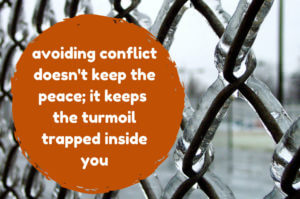We all know that disagreements between partners are common. Whether they are big issues or little issues the potential for disagreement is a common part of any couple trying to work together or get along.
When a potential disagreement arises we always have a choice to make. Should we A) speak up, say what we really think or how we are really feeling and introduce conflict into the relationship? Or B) keep our thoughts to ourselves and spare the relationship from the conflict that could be caused by our speaking up?
 We are aware that the option of speaking up can introduce conflict into the relationship. Option A can seem like a difficult choice to make. So, we often don’t. It just seems easier to keep to ourselves, even if we know that speaking up is the right thing to do. In the end, we make the choice to keep our thoughts to ourselves because we think that we have avoided conflict.
We are aware that the option of speaking up can introduce conflict into the relationship. Option A can seem like a difficult choice to make. So, we often don’t. It just seems easier to keep to ourselves, even if we know that speaking up is the right thing to do. In the end, we make the choice to keep our thoughts to ourselves because we think that we have avoided conflict.
Consider this: conflict actually exists in either option.
When the partner speaks out and says what’s on their mind: “I don’t like that restaurant,” “I need some time alone,” “You hurt my feelings,” etc. then the conflict exists out in the open, in the relationship. It is known. The instant the phrase is said both partners are aware that there is a potential disagreement; and both partners feel the conflict.
When a partner chooses to keep their thoughts inside, the conflict still exists. It just isn’t addressed. Because the potential disagreement isn’t brought up out loud the other partner doesn’t know it exists. They are going to believe that the restaurant is fine, or it’s okay to just hang out, or a hurtful statement was taken as a joke, etc. They will not know about the potential disagreement and they will not feel the conflict. The partner keeping their thoughts inside, however, will feel the conflict – even as they stuff it down. They will know it exists.
The choice we make about how to handle a potential disagreement isn’t at all about avoiding conflict or creating it, it is actually about deciding where the conflict is going to exist. Will it exist out loud in the relationship so both partners are aware of it? Or will it be silent and internalized within one partner so that only that person is aware of it? In either scenario the conflict exists, it is just a matter of where it exists and who is aware of it.
Conflict always requires compromise in order to be resolved.
 When the potential disagreement is acknowledged out loud and both partners are aware of it then the compromise happens between both partners. They can pick a different restaurant, or give the other some space for a while, or apologize for saying something hurtful and commit to never saying it again, etc. In this scenario the potential disagreement is acknowledged out loud, both partners feel the conflict, both partners work together to resolve the conflict through compromise and move on.
When the potential disagreement is acknowledged out loud and both partners are aware of it then the compromise happens between both partners. They can pick a different restaurant, or give the other some space for a while, or apologize for saying something hurtful and commit to never saying it again, etc. In this scenario the potential disagreement is acknowledged out loud, both partners feel the conflict, both partners work together to resolve the conflict through compromise and move on.
When one partner chooses to keep a potential disagreement inside and only they are aware of it and only they feel the conflict, then the compromise happens inside them. When the conflict has been internalized, the compromise will be internal too. The compromise that internalized conflict requires is that the partner compromises a bit of their self — every time.
Over time this compromise chips away at their sense of self in the relationship and they begin to feel smaller and smaller in the relationship, less important, like they have no voice or don’t matter to their partner, and eventually they feel resentful.
It is this hidden cost of avoiding conflict that often causes the breakdown in communication for a couple. In Part 3, we will explore some more negative effects of conflict avoidance on relationships.
Read Don’t Let Conflict Harm Your Relationship, Part 1.
Read Don’t Let Conflict Harm Your Relationship, Part 3.
If you believe that you and your partner would benefit from sessions of direct counseling on this issue and you live in the Grand Rapids area, contact The Grand Rapids Therapy Group today to set up an appointment with Dr. Thornsen.
